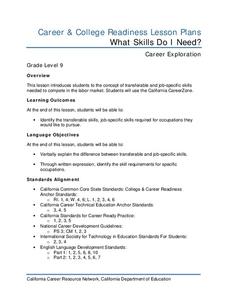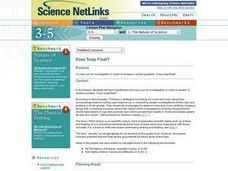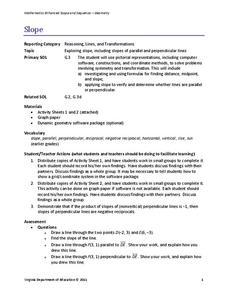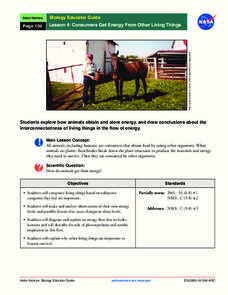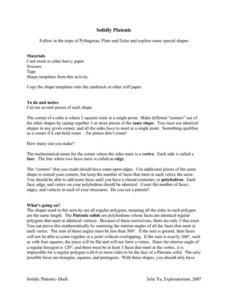US Institute of Peace
What Does It Take to Be a Peacebuilder?
Is the spirit of peacebuilding already inside you? Scholars take a closer look at the characteristics of peacebuilders, past and present, in lesson 13 of a 15-part series. Individuals identify common traits of peacebuilders, then work...
PBS
An Attack on Syria- What Would You Do?
Has United States military intervention in the conflicts of other countries always been warranted? After reviewing a brief background on contemporary US conflicts and reading articles describing the civil war in Syria, your learners...
Chicago Botanic Garden
Albedo, Reflectivity, and Absorption
What is reflectivity, and what does it have to do with the Earth's climate? As reflectivity is measured by albedo, scientists can gather information on Earth's energy balances that relate to global warming or climate change. Budding...
Classroom Law Project
Who are the major candidates and where do they stand?
Who were the candidates in the 2008 US Presidential election and where did they stand on important issues? Use a resource that offers an opportunity to go back in time and examine candidates and issues involved in that election year.
California Department of Education
What Skills Do I Need?
Get your class started down the path to a great career! The first of a six-part series of career and college lessons inspires learners to use their interests to explore career options. The activity also provides resources where...
ReadWriteThink
Critical Media Literacy: Commercial Advertising
Commercial advertising—we can't get away from it, but do we realize just how often we are being advertised to? With this lesson plan, scholars analyze mass media to identify how its techniques influence our daily lives. Learners browse...
Museum of Tolerance
What Do I Know Already? What Can I Predict?
In preparation to a visit to the Museum of Tolerance, class members engage in a prediction activity by creating a folder to house materials they feel represent ideas, topics, or issues they may encounter during their visit.
National Sailing Hall of Fame
Sail Area Calculations
Do bigger sails mean that the sailboat goes faster? Middle and high schoolers compare sailboats, and learn that simply calculating sail area is not enough. A slideshow presentation demonstrates how to calculate the Sail...
Computer Science Unplugged
Lightest and Heaviest—Sorting Algorithms
How do computers sort data lists? Using eight unknown weights and a balance scale, groups determine the order of the weights from lightest to heaviest. A second worksheet provides the groups with other methods to order the weights. The...
Curated OER
The Preamble to the Constitution: How Do You Make a More Perfect Union?
Students analyze the Preamble of the Constitution and identify the historical context that led to its wording. They, in groups, interpret phrases from the Preamble, examine relevant court cases and create illustrations for their portion...
Curated OER
Where Do You Stand?
Scholars assess a government's ability to intervene in personal health decisions. They research basic facts about euthanasia and describe their opinions about new legislation passed in the United States Congress about an individual's...
Curated OER
Why Do We Remember Revere? Paul Revere's Ride in History and Literature
Students examine primary documents regarding Paul Revere's ride and its role in the Revolutionary War. They consider how Revere's role has been written about by Longfellow and others and discuss the discrepancies between accounts.
Curated OER
ESL: Do or Does?
In this ESL do/does worksheet, students choose either does, doesn't, do or don't from a drop down list to correctly fill in blanks in sentences. Page has a link to additional activities.
Curated OER
Do Not Go Gentle into That Good Night Questions
In this reading comprehension worksheet, students respond to 5 short answer and essay questions based on the poem "Do Not Go Gentle into That Good Night."
Curated OER
Make Or Do?
In this word choice activity, students complete a ten question multiple choice on-line interactive quiz about the correct use of "make" or "do".
Curated OER
Make/Do: Creating versus performing
In this make and do worksheet, students choose the correct form of the words make or do to complete the sentences. Students complete 10 sentences total.
Curated OER
How Do I love Thee? Let Me Count the Ways.
In this reading comprehension learning exercise, students respond to 4 short answer and essay questions based on the poem "How Do I Love Thee? Let Me Count the Ways."
Curated OER
Does Soap Float?
Students form hypotheses and carry out an investigation in order to answer a central question: Does soap float? The focus of this lesson plan is on scientific inquiry, but it incorporates scientific topics such as sinking and floating.
Curated OER
Where Does Food Come From?
Students recognize that food we eat comes from farms. In this where does food come from lesson, students discuss planting crops and how they grow. Students plant seeds for edible crops and eat them when are ripe. Students...
Curated OER
Do-Does-Did
In this do, does, and did worksheet, students complete sentences by filling in either do, does, or did into the blank. Students complete this for 10 sentences.
Curated OER
To Be or To Do in questions
In this to be or to do instructional activity, students choose the correct form of to be or to do to fill in the blank to question sentences. Students complete 15 problems.
02 x 02 Worksheets
Slope
What does slope have to do with lines? Pupils work with lines and determine the slope of the lines informally and with the slope formula. Groups use their knowledge to calculate the slopes of parallel and perpendicular lines. They also...
NASA
Consumers Get Energy From Other Living Things
How do plants and animals get their food? Learn about where energy comes from, how animals store energy, and aerobic respiration, in a lesson that allows scholars to diagram energy flows.
Curated OER
Solidly Platonic
When they do, they learn. Using this resource, young mathematicians learn about platonic solids by actually building, touching, and examining the shapes. They connect their observations about the shapes to Euler's formula.
Other popular searches
- Do Does and Did
- Does and Do
- Grammar Do and Does
- Using Do or Does
- Verbs Do and Does
- Esl Do Does
- Do Does Grammar
- Do Does Questions
- Does or Do
- Do Does Practice
- Esl Do Does Game
- Do, Does,did






